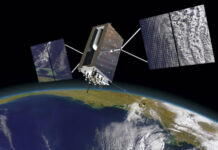The satellite constellation will not have to rely on GPS to operate
Japan this week announced plans to increase the number of its navigation satellites from four to 11. The announcement, made by the country’s space policy committee, allows Japan to operate its Michibiki Quasi-Zenith Satellite System (QZSS) without relying on the U.S.-based GPS, according to Nikkei Asia.
While no launch timetable was publicly revealed for the additional satellites, in a December 2022 space policy document, Japan called for a seven-satellite constellation to be launched in fiscal years 2023 to 2024, depending on the status of the H3 launch vehicle.

Currently, the QZSS satellites are in geosynchronous orbit above Japan and Australia. In the previously announced seven-satellite configuration, the constellation will consist of one quasi-zenith satellite, a geostationary satellite and one quasi-geostationary satellite to increase the range where QZSS signals can be received.
The first QZSS satellite was launched in 2010 on a Japanese H-IIA rocket. The system has four operational satellites since 2018. The rise of precise location information for autonomous vehicles, drone delivery services, and potential disruption of the GPS signal, has spurred countries to develop their own satellite navigation systems and or augmentation services.
In January, the U.S. Space Force delivered two hosted payloads for QZSS. Japan will integrate the payloads into two satellites it plans to launch. The payloads are designed to monitor spacecraft and dangerous debris in geosynchronous orbit.
The primary payload developer, Massachusetts Institute of Technology’s Lincoln Laboratories (MIT/LL), will travel to Japan to help with the payload’s integration and testing. Overall, the Space Force’s Space Systems Command is managing the program.


























